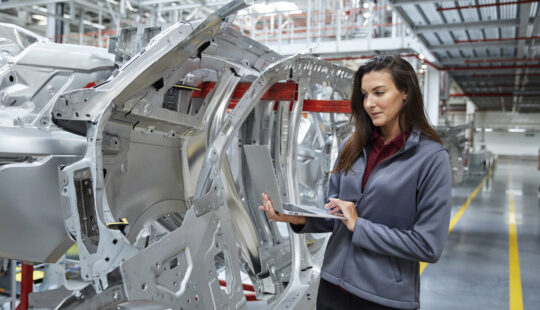Artificial intelligence (AI) is here, whether we like it or not. In my opinion, the rapid rise of generative AI can be attributed to three factors:
- Firstly, technological progress, as improved AI architectures and available data have enabled models to perform impressively.
- Secondly, an economic effect as successful platforms of the past, such as the Internet and the cloud, experienced breakthroughs when marginal costs approached zero. That was the birth of platform innovation. In the case of the Internet, for example, the cost of distributing increasing amounts of content approached zero. When it comes to content creation, we are also seeing the same thing now with generative AI. Therefore, AI is not just hype, but an innovation platform.
- Thirdly, we are witnessing a growing social acceptance. Generative AI was brought into the consciousness of the general public as millions of users suddenly gained access, seemingly overnight, to language models like ChatGPT and tried them out for themselves.
AI is powerful, but not all-powerful. Artificial intelligence are big words. Smart neural networks and models excite us because they are designed to mimic human patterns as closely as possible. They can offer solutions for certain types of problems. What they can’t do is find a solution to a previously unsolved problem and compete with the inexhaustible creativity and empathy of humans.
Recently, I was asked to name an example when AI really ‘wowed’ me. For me, it was the moment I read that ChatGPT had passed the medical exam in the U.S. My wife is a doctor, so I’m somewhat familiar with medicine and everyday hospital life. Will AI replace humans here? No. Will technology like AI improve the lives of healthcare workers and thus patients? I believe so. AI creates space for professionals where they are most needed.
AI is changing everything. Are we just going along with this change or are we boldly leading the way? We are at a crucial point where generative AI will also significantly change business processes in companies. McKinsey considers AI to be a productivity booster and predicts worldwide increases in the trillions. This is urgently needed if we look at demographic trends and the growing shortage of skilled workers. Provided that companies use AI consistently, this much is certain: AI will revolutionize the way we work and live.
AI will shape our country. The question is whether we see it as a threatening competitor or a helpful companion. It is up to us to decide whether these significant changes will provide a boost to innovation in Germany and Europe. Germany, and indeed each of us, must adapt to change in order to remain globally competitive. It is important to recognize and minimize the risks, but also to see the opportunities as chances.
So, what do we need to do in order to seize this opportunity for Germany?
Use Strengths and Competitive Advantages
According to an IW study, systems with generative AI capabilities can contribute to approximately €330 billion of future value creation in the German economy. We would be able to gain a competitive advantage if AI is value-oriented, transparent, and explainable. A suitable legal framework with high ethical standards promotes the ability to innovate; over-regulation would have the opposite effect. We should not categorically classify generative AI as high-risk, but rather leave room for innovation.
We are moving in the right direction with the EU AI Act’s risk-based approach. And when the various regulations on AI and data protection interact, we are on the right track. Because there can be no compromises in the use of AI when it comes to business-critical processes and decisions.
Therefore, at SAP, we see it as our duty to deliver responsible, reliable, and business-relevant AI results. That is why we are looking at how to best utilize the various models to provide value to customers. The models behave very differently. We see ourselves as a driving force in terms of enterprise AI. However, we do not rely solely on our own expertise, but collaborate with research institutions and leading providers of generative AI.
Our credo is: AI is a natural part of our software and intuitively integrated into processes and applications. Why? Because for us, it’s not about writing a poem with AI, but about using AI in a specific business context based on real-time data — and, when necessary, to support business-critical decisions.
To make this possible, we are working on our own foundation model, which is trained on the data of thousands of customers that have consented to the use of their data. AI models trained on publicly available data do not have this valuable context. Therefore, while they may pass a medical exam because the knowledge is available on the Internet, they will not be able to answer complex questions in the context of a company. Because AI is only as good as the data it relies on. This includes filtering out biased data or queries.
Promote a Climate of Innovation and Openness to Technology
Currently, 73% of major AI models are developed in the U.S. and 15% in China. This is also due to the willingness to invest. The fact that the German government will invest around €3.5 billion in AI by 2025 is a positive signal, but it is not enough. The private sector also needs to invest significantly more across all industries. Additionally, the “can do” mentality is more pronounced elsewhere. Of the 1,300 startup unicorns worldwide, only 36 are in Germany. Our AI research is among the best; however, the insights rarely lead to companies being created.
We do not lack knowledge in Germany, we lack the will to implement it. And according to the LEAM: AI feasibility study, there is also a lack of computing power and a supercomputing infrastructure for AI.
We should also strengthen small and midsize enterprises (SMEs). As the backbone of the German economy, SMEs must receive the necessary support — including from the public sector — to drive AI forward. According to a bitkom study, 15% of all companies are already using AI. But this is not yet the urgently needed boost to AI innovation. At least 68% understand the importance of AI and consider AI to be the most important future technology, but too few are taking action.
This clearly shows that most people are looking into AI. But for many companies, AI is not yet an issue. This gap needs to be closed so that in the future not just a minority but a majority of companies use AI. We must act instead of hesitating!
Culturally Embedding a Readiness for Change and Lifelong Learning
Innovation starts in the mind. Every company wants employees who think like entrepreneurs. Those who don’t want to wait for something coming from other corners of the world. But for that, we need to overcome our reservations towards new technologies. Fears are blocking our view of opportunities and companies have a duty to act now. Transparency is the most important means to alleviate employees’ concerns about automation and AI.
AI will not make humans redundant, but it will change our existing professions. Well-trained professionals are and will remain indispensable, and AI can help to counteract the shortage of skilled workers to some extent. Not only the technologies themselves, but above all the responsible handling of data must be an integral part of school education. Similarly, companies should integrate AI into their company’s further education.
But what is particularly important is that for most professionals, it is not about understanding AI in every detail. There are experts for that, just as there are experts who design complex manufacturing machines. It is about developing the skills of the future: critical thinking and the ability to assess information and above all, empathy. Putting oneself in other people’s position is the core competency of the future! These are skills that make humans unique.
Therefore, I do not see AI as an apocalypse, but rather as one of our best chances for renewal and progress. Because the interaction between humans and machines is not a duel, but a duet.
Thomas Saueressig is a member of the Executive Board of SAP SE.



